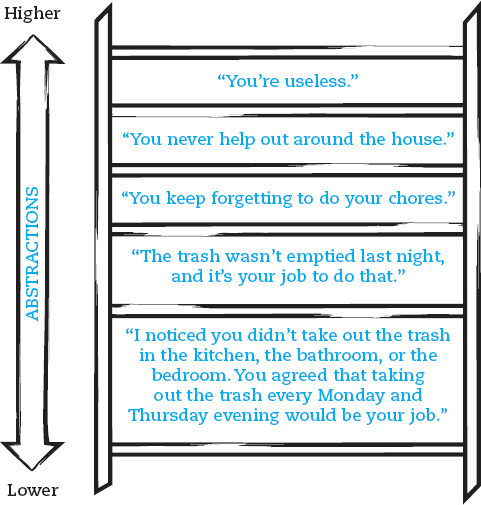Abstraction and Meaning
Abstraction and Meaning
Page 81

Language operates at many levels of abstraction, meaning that it can range from being very vague to very specific. You might talk in such broad, vague terms that no one knows what you are staying (“Stuff is cool!”), or you can speak so specifically that people may think you are keeping notes for a court case against them: “I saw you at 10:32 P.M. on Friday, January 29, at the right-hand corner table of Harry’s Bar with a six-foot-tall, brown-haired man wearing black jeans, boots, and a powder-blue T-shirt.”
The famous linguist S. I. Hayakawa (1964) illustrated the specific versus the general levels of abstraction by constructing an abstraction ladder (see Figure 4.1). The top rungs of the ladder are high-level abstractions: these are the most general and vague. Lower-level abstractions are more specific and can help you understand more precisely what people mean. “Request something interesting from Netflix” is a high abstraction that allows a wide range of choices (and the possibility of some really bad movies). Saying “I’d like to watch an action film tonight” (lower abstraction) is more likely to get you something you’ll enjoy, but naming the exact movie (“Get The Avengers”) ensures satisfaction.
But even though lower abstractions ensure clarity, high abstractions can accomplish certain communication goals. Here are a few examples:
- Evasion. Through evasion, we avoid providing specific details. A teenager might tell her parents that she is “going out with some friends.” Her parents might counter by demanding less abstract answers: “Where exactly are you going to be? Which particular friends are you going with?”
- Equivocation. Through equivocation, we use words that have unclear or misleading definitions. Equivocation can help us get out of an uncomfortable situation, as when a friend asks what you think of her new sweater—which you think is hideous—and you reply, “It’s . . . colorful.”
- Euphemisms. Sometimes we use euphemisms, inoffensive words or phrases that substitute for terms that might be perceived as upsetting. For example, you might say that your uncle “passed on” rather than “died” or that your mother had a “procedure” rather than an “operation.”
Finally, abstract language can offer information about your affiliations and memberships. For example, slang is language that is informal, nonstandard, and usually particular to a specific group; it operates as a high-level abstraction because meanings of slang are known only by a particular group of people during a specific time in history. A rock concert might be described as “groovy,” “totally awesome,” or “off the hook”—each expression places the speaker in a particular time or place in the world. Teenagers might alert each other online that they’ve “GTG” (got to go) because of “POS” (parent over shoulder), and their parents are none the wiser.
Culture and You
What kinds of slang do you regularly use? How did you become familiar with these terms, and how would you go about explaining them to someone unfamiliar with them?
Related to slang is jargon, technical language that is specific to members of a given profession or interest group or people who share a hobby. Jargon may seem abstract and vague to those outside the group but conveys clear and precise meanings to those within the group. For example, when a fan of the model game Warhammer 40K speaks of “kit bashing,” other fans understand that the speaker is taking parts from two different models and mixing them together. The rest of us, however, would probably just stare blankly.